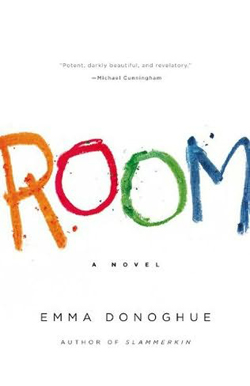Michelle Palmer
michellepalmersbooks.blogspot.com
Meet Jack. He has his favorite toys, he loves to watch television (particularly Dora the Explorer) and he thrives on routine. Most of all, he is excited to be turning five, when he will be a “big boy.” But Jack’s similarities with the average child end there because Jack has never seen the outside world—in fact, he does not even realize that a world exists outside his eleven-by-eleven storage shed, which he calls “Room.”
Room, by Emma Donoghue, takes us inside Jack’s world, where ordinary household items are personified, and each day consists of routines and games to deal with the boredom of life in this tiny house. Jack’s mother, known to us as Ma, was kidnapped at age 19 while walking on a college campus. She has been held hostage in a storage shed in “Old Nick’s” backyard for seven years, during which time she gives birth to Jack. Told exclusively in Jack’s precocious voice, Room is a gripping novel that shows what life is like for those held captive, and perhaps more importantly, when those captives are free.
After his long-anticipated birthday, Jack quickly learns two things: there is a whole world outside of Room, and the only world he does know is no longer safe. Ma develops a plan to escape, and unlike many books that focus on captivity, Ma and Jack become free long before the novel is over. One of the Room’s strengths is that it shows not only the life of a captive, but what it means to reintegrate into society after having years of life taken away.
Room also shows the impact abductions have on the families left behind. Ma’s mother is understandably shocked to learn that not only is her daughter alive, but she has a child. Ma’s father is unable to accept any part of the situation—Ma’s abduction, rescue, and a grandson born of rape—in part because he had a funeral for Ma years before, thinking she was dead. Ma’s reemergence into society is bittersweet and fraught with obstacles; she finally has the freedom she’s longed for, but at a high price, because life for her and Jack will never be the same.
Donoghue’s use of Jack as narrator is what makes this book so unique. His sweet, innocent approach is in striking contrast to the circumstances in which he lives. Through Jack’s eyes, it is easier to absorb the sheer horror of Ma’s situation, such as when Old Nick visits at night. While Jack is locked in the wardrobe, he “counts the squeaks of Bed” until it’s time for Old Nick to leave again. Donoghue sometimes falters throughout the novel in using Jack’s voice, with inconsistencies and an unevenness that can be distracting. On the whole, however, Jack is a wonderful protagonist. Seeing the world through him makes the details of the novel not only bearable but riveting. It is Jack’s heartbreaking experiences and poignant observations that will linger with you long after the novel is complete.















Love that you’re promoting literacy.
Comment September 6, 2011 @ 2:48 pm